The debate over whether cats can safely consume raw chicken remains a contentious issue in the realm of feline nutrition. Understanding the implications of introducing raw meat into a cat's diet requires a nuanced approach that considers both risks and benefits.
As we navigate the intricacies of this topic, it becomes evident that informed decision-making is paramount when it comes to our feline companions' well-being.
Stay tuned to uncover the essential insights into feeding raw chicken to cats and how it may impact their dietary requirements and overall health.
Key Takeaways
- Consult a vet before feeding raw chicken to your cat for safety.
- Raw chicken poses risks of parasites, bacteria, and nutritional deficiencies.
- Mimicking a wild cat's diet with raw meat can be ideal but risky.
- Consider cooked chicken or high-quality commercial cat foods for safer nutrition.
Risks of Feeding Raw Chicken to Cats
Feeding raw chicken to cats poses significant health risks due to potential bacterial contamination and the lack of a complete nutritional profile in the meat. Raw chicken may harbor harmful bacteria like Salmonella and Campylobacter, leading to gastrointestinal distress or systemic illness in cats. Additionally, raw chicken bones can present choking hazards or internal injuries.
To ensure your feline companion's well-being, it is crucial to consider these risks before incorporating raw chicken into their diet. Consulting with a veterinarian can provide valuable guidance on safer dietary options that meet your cat's nutritional requirements while minimizing potential health hazards associated with raw meat consumption.
Prioritizing your cat's health and safety is paramount when deciding on their dietary choices.
Precautions for Raw Chicken Consumption
When considering the introduction of raw chicken into a cat's diet, prudent measures must be taken to safeguard their health and well-being. Raw chicken carries the risk of bacterial contamination, such as Salmonella and Campylobacter, which can cause gastrointestinal distress or systemic illness in cats.
To mitigate these risks, it is crucial to handle raw chicken carefully. Ensure that the chicken is fresh and sourced from reputable suppliers. Thoroughly clean any surfaces or utensils that come into contact with the raw meat to prevent cross-contamination. Additionally, considering cooking the chicken before feeding it to your cat can help reduce the chances of bacterial infection.
Monitoring your cat for any adverse reactions after consuming raw chicken is essential for prompt veterinary intervention if needed.
Symptoms of Raw Chicken Contamination
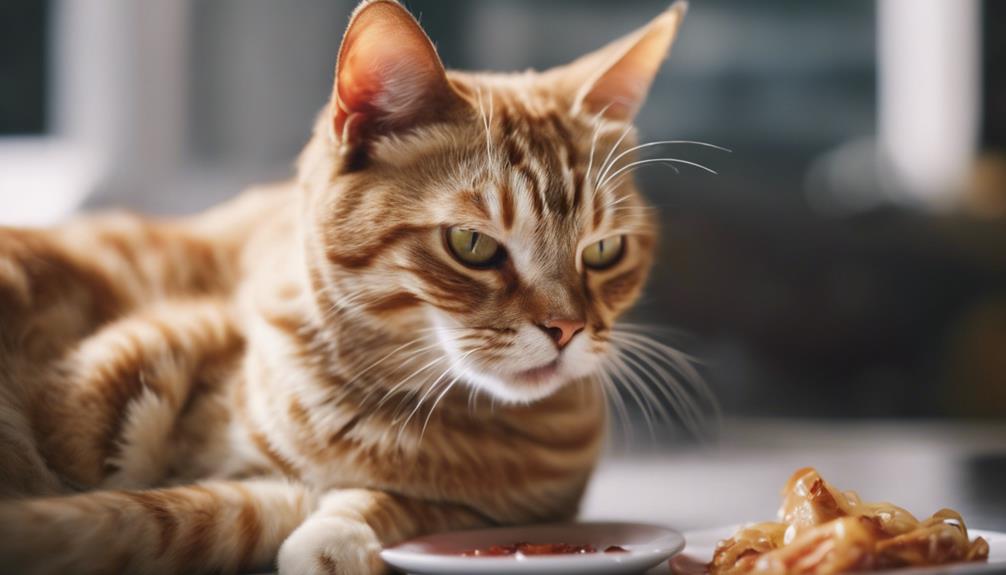
Upon ingestion of raw chicken, cats may exhibit symptoms indicative of bacterial contamination, necessitating immediate attention and veterinary care. Some common signs of raw chicken contamination in cats include:
- Vomiting: Cats may vomit frequently or have difficulty keeping food down.
- Diarrhea: Loose stools or diarrhea may be present, often with an unpleasant odor.
- Lethargy: A lack of energy or interest in usual activities can indicate illness.
If your cat displays any of these symptoms after consuming raw chicken, it is crucial to seek professional veterinary assistance promptly. Early intervention can help prevent further complications and ensure your feline companion receives the necessary treatment.
Benefits of Mimicking Wild Cat Diets
Mimicking the ancestral diet of wild cats can offer numerous advantages for domestic felines in terms of nutritional balance and overall health. By incorporating raw meat, bones, and organs into their diet, cats can access essential nutrients like taurine that are vital for their well-being.
This diet closely resembles what cats would consume in the wild, ensuring they receive a high-protein, species-appropriate meal. Additionally, feeding raw meat can help maintain a healthy weight, improve digestion, and promote lean muscle development in cats.
Importance of Consulting a Veterinarian
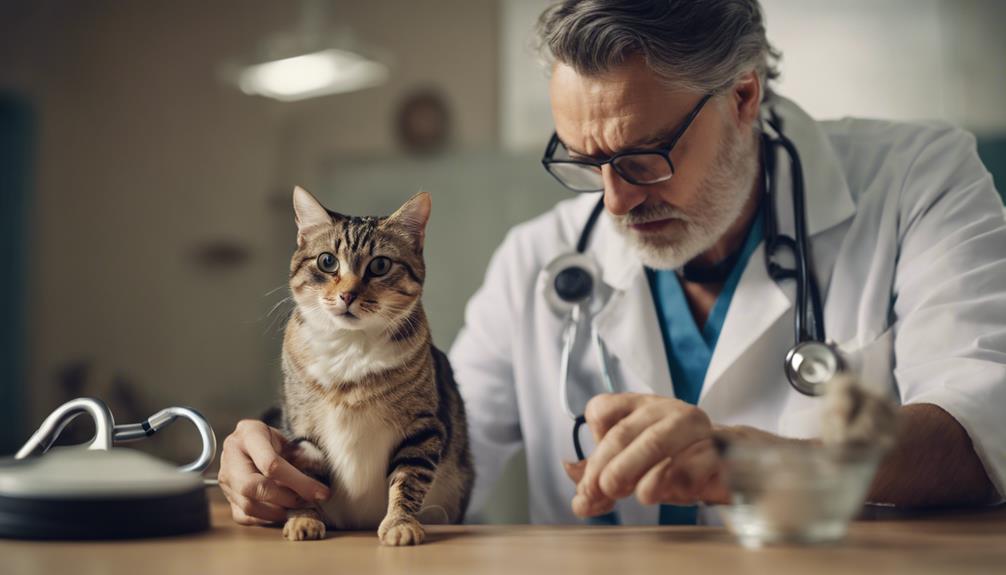
Seeking guidance from a qualified veterinarian is essential when considering dietary changes for your feline companion. Veterinarians play a crucial role in ensuring your cat's health and well-being, especially when it comes to introducing raw chicken or any dietary modifications. Here are three reasons why consulting a vet is vital:
- Personalized Assessment: Vets can evaluate your cat's specific nutritional requirements and health status to recommend suitable dietary choices.
- Professional Advice: Veterinarians can provide expert guidance on the risks and benefits of feeding raw chicken, tailoring recommendations to your cat's individual needs.
- Monitoring and Support: Regular consultations with a vet can help monitor your cat's health, address any concerns promptly, and ensure a balanced diet for optimal feline health.
Nutritional Deficiencies in Raw Chicken
When considering the nutritional adequacy of raw chicken for cats, potential deficiencies must be carefully evaluated. Raw chicken alone may lack essential nutrients vital for a cat's overall health. Taurine, an amino acid crucial for feline heart and eye health, is often insufficient in raw chicken.
Additionally, raw meat may not provide a well-rounded balance of vitamins and minerals necessary for a cat's diet. Without these vital nutrients, cats may develop deficiencies that can lead to various health issues over time.
To ensure your cat receives all the necessary nutrients, it's essential to consult with a veterinarian or animal nutritionist before incorporating raw chicken or any raw meat into their diet.
Pathogens in Raw Chicken
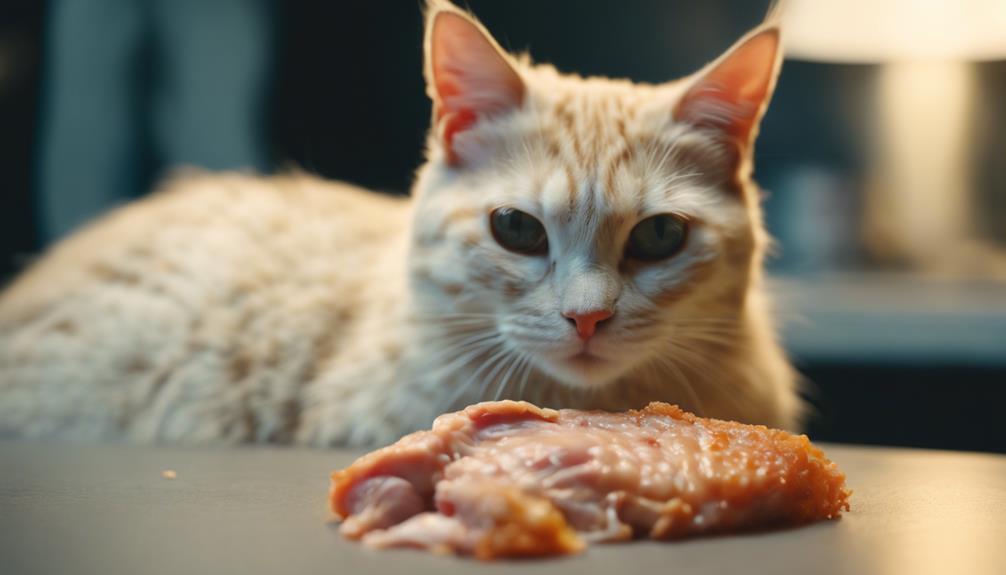
Pathogens commonly found in raw chicken, such as Salmonella and Campylobacter, pose significant health risks to cats when consumed. These bacteria can lead to gastrointestinal issues, systemic illness, and potential long-term health consequences for your feline friend. To ensure the safety of your cat, it is crucial to be aware of the risks associated with feeding raw chicken. Here are some key points to consider:
- Salmonella and Campylobacter: These bacteria are prevalent in raw chicken and can cause severe infections in cats.
- Cross-contamination: Raw chicken can spread pathogens to other surfaces and foods if not handled properly.
- Proper hygiene: Maintaining good hygiene practices while handling raw chicken is essential to minimize the risk of bacterial contamination.
Safety Measures for Handling Raw Chicken
To ensure the well-being of your feline companion, implementing proper safety measures when handling raw chicken is paramount due to the potential health risks associated with bacterial contamination. Watch for symptoms if your cat consumes raw chicken, and promptly contact the vet if needed.
Always ensure that raw chicken is properly prepared to reduce the risks of bacterial contamination. It is crucial to use fresh raw chicken from reputable sources and clean all surfaces thoroughly when handling the meat. Consider cooking the raw chicken to further reduce the risk of pathogens.
Ensuring Freshness of Raw Chicken
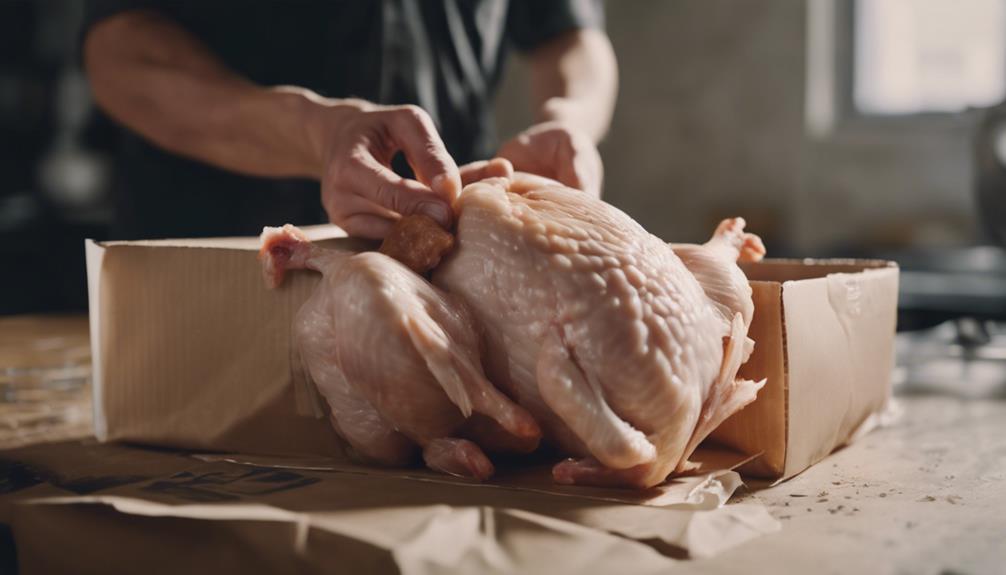
Ensuring the freshness of raw chicken is crucial for maintaining the quality and safety of your cat's potential diet. To ensure the chicken you provide is fresh and safe for your feline friend, consider the following:
- Check the Expiry Date: Always check the expiration date on the packaging before purchasing raw chicken.
- Inspect the Color and Smell: Fresh raw chicken should have a pinkish color and a neutral odor. Discard chicken with a sour or off smell.
- Store Properly: Keep raw chicken refrigerated at all times and use it within a couple of days to prevent spoilage.
Cleaning Procedures for Raw Chicken
When handling raw chicken for your cat's diet, meticulous cleaning procedures are essential to minimize the risk of bacterial contamination and ensure the safety of the food.
Begin by washing your hands thoroughly with soap and water before and after handling raw chicken. Clean all surfaces, utensils, and cutting boards that come into contact with the chicken using hot, soapy water.
To further reduce the risk of cross-contamination, consider using separate cutting boards and utensils specifically for raw meat. Additionally, sanitize countertops and sinks after preparing raw chicken.
Proper cleaning procedures are crucial in preventing the spread of harmful bacteria and maintaining a safe environment for both you and your feline companion.
Cooking Raw Chicken for Cats
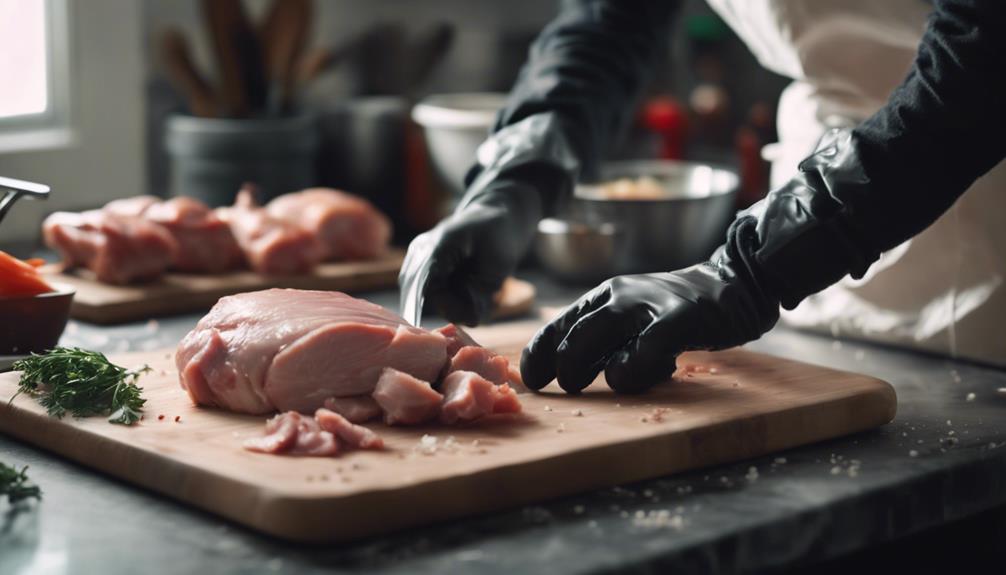
For optimal safety and nutritional benefits, cooking raw chicken before feeding it to your cat is strongly recommended. When preparing cooked chicken for your feline companion, consider the following:
- Temperature Control: Ensure the chicken is thoroughly cooked to kill any harmful bacteria present.
- Bone Removal: Remove bones from the cooked chicken to prevent choking hazards or internal injuries.
- Cutting into Small Pieces: Cut the cooked chicken into small, manageable pieces for your cat to safely consume.
Meeting Cats' High Protein Needs
Cats require a diet high in protein to meet their unique nutritional needs as obligate carnivores. Protein is essential for muscle maintenance, growth, and overall health in cats. When considering feeding your cat raw chicken, it's crucial to ensure they receive adequate protein levels. Below is a breakdown of protein content in common cat food sources:
| Food Source | Protein Content (%) |
|---|---|
| Raw Chicken | 18-20% |
| Cooked Chicken | 28-32% |
| Canned Cat Food | 8-12% |
| Dry Cat Food | 30-35% |
| Raw Beef | 18-20% |
Understanding these protein levels can help you make informed decisions when planning your cat's diet.
Essential Nutrients in Raw Meat
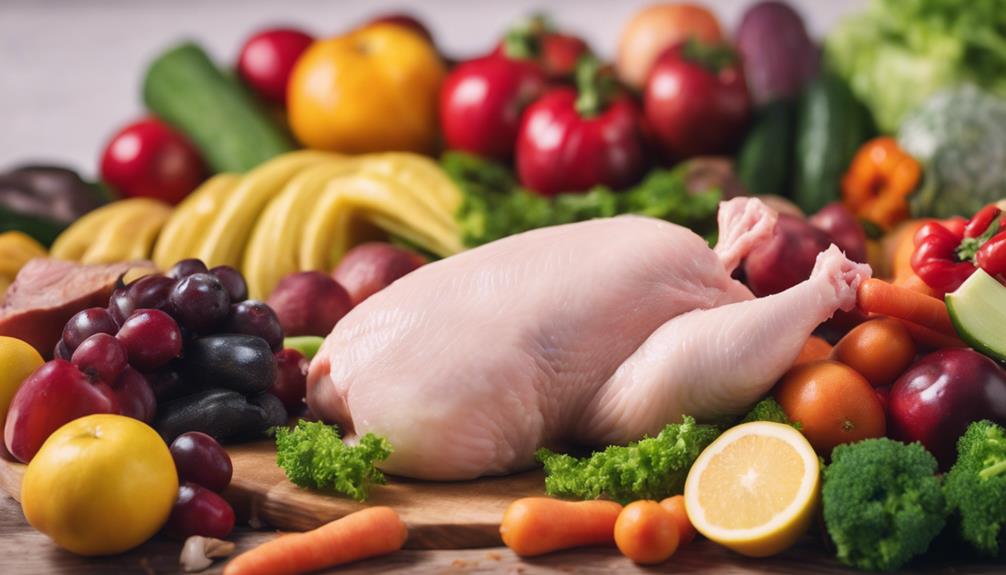
Raw meat serves as a potent source of essential nutrients vital for feline health and well-being. When considering feeding your cat raw meat, it's essential to understand the valuable nutrients it can provide:
- High-Quality Protein: Raw meat contains protein essential for muscle development and overall health.
- Natural Fats: Healthy fats in raw meat support skin, coat, and energy levels in cats.
- Vitamins and Minerals: Raw meat offers crucial vitamins like B12 and minerals such as iron, which are vital for various bodily functions.
Incorporating raw meat into your cat's diet can contribute to a well-rounded nutritional profile, but it's crucial to ensure a balanced diet with all necessary nutrients.
Balancing Cats' Diet With Supplements
Supplementation plays a crucial role in ensuring the nutritional balance of a feline's diet when considering raw meat or commercial cat foods. While raw meat can offer essential nutrients, it may not provide a complete and balanced diet for your cat. Supplements can help bridge these nutritional gaps, ensuring your feline friend receives all the necessary vitamins and minerals for optimal health.
Taurine, for example, is an essential amino acid that cats require in their diet. Consulting with a veterinarian can help determine the specific supplements your cat may need based on their individual dietary requirements. By incorporating supplements thoughtfully, you can enhance your cat's diet and promote their overall well-being.
Conclusion
In conclusion, the decision to feed cats raw chicken requires careful consideration of the risks and benefits involved. Consulting a veterinarian is crucial to ensure that the cat's nutritional needs are met.
While raw chicken can provide essential nutrients and mimic wild cat diets, precautions must be taken to prevent contamination. By balancing their diet with supplements and proper cooking techniques, pet owners can provide their feline companions with a diet that promotes health and vitality.
Remember, the stakes are as high as a cat chasing a laser pointer!




